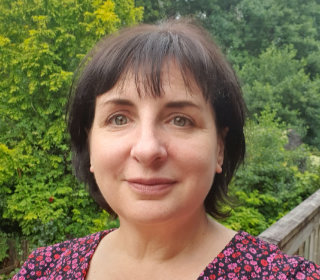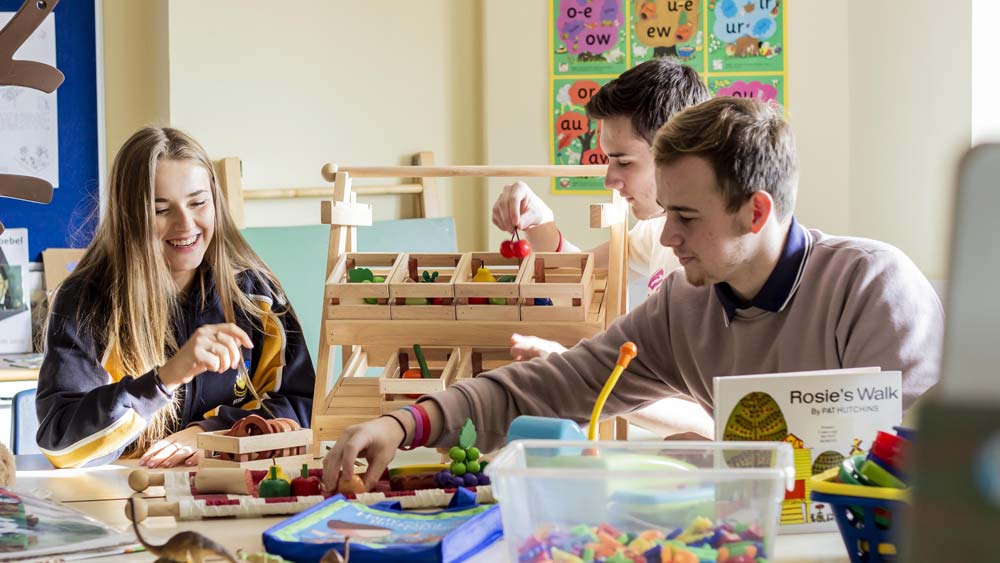FdA Early Years
You know how to unlock others' potential. Now it's time to unlock yours. Study for a two-year foundation degree while working in Early Years, learning concepts and skills to enable you progress your career.


Earn while you learn

Keep in touch with this course
Entry requirements
Three A-levels at grades DDE-DDD or above
Or BTEC triple grades MPP-MMP or above
Or Access 9-15 D/M with min 3D
GCSE Grade C or 4 English Language or an acceptable equivalent qualification
Or T level P (D or E on the core)
- 10 hours per week of relevant paid or voluntary work, and have the support and involvement of your employer.
- Commitment to equality and to developing anti-discriminatory approaches in practice.
- Access to the internet for online learning.
- All applicants must have an informal conversation (either in person or on the phone) with a course tutor.
- Applicants with other qualifications and/or experience will be considered on an individual basis.
We are committed to safeguarding and promoting the welfare of children and students. All students are expected to share this commitment and demonstrate consistently high standards of personal and professional conduct.
We will accept 2 AS levels in lieu of one A level but must be accompanied by 2 A Levels or BTECs (General Studies is excluded).
UCAS points 64-72
UCAS code X900
UCAS institution code P63
Duration Two years full-time or four years part-time
Full entry requirements
- 10 hours per week of relevant paid or voluntary work, and have the support and involvement of your employer.
- Commitment to equality and to developing anti-discriminatory approaches in practice.
- Access to the internet for online learning.
- All applicants must have an informal conversation (either in person or on the phone) with a course tutor.
- Applicants with other qualifications and/or experience will be considered on an individual basis.
Any questions?
Contact Tara Godber, our Applicant Support Coordinator, if you have any questions. Email applicantsupport@marjon.ac.uk and Tara will get back to you.
Course Summary
Study for a two-year foundation degree while working in Early Years. Flexible study means you attend university just 23 days in each year. After achieving your foundation degree you’ll have the opportunity to join the final year of an honours degree which opens doors to professional and postgraduate courses such as Early Years Initial Teacher Training (EYITT).
You’ll work with young children for at least 10 hours per week on a paid or voluntary basis and will have support from a mentor in your workplace. Combining higher level academic study with your experience of working in Early Years, this Early Years degree offers personal and professional development alongside the opportunity to join a learning community of like-minded people.
The first year begins with a two-day induction and you’ll then attend university on Fridays for a full day of teaching as scheduled across the academic year. You will also need to study at home, using the internet to access course materials.
In addition to the taught part of the course, you will be involved in work-based learning modules throughout the two years; these enable you to make ‘practice’ links with the ideas explored in taught modules.
You’ll also attend work-based learning workshops at university (typically 3 days per year) and produce written assignments showing how theory gives you insights into practice. Your workplace will need to support you in terms of allowing you to attend the course and by providing a mentor (usually someone with a degree or professional qualification) who will meet with you for an hour every two or three weeks - during which time you’ll explore how your learning relates to practice at work.
Why this course at Marjon?
Designed for those working in Early Years settings
Competitive fees
Full university library resources on site and online
Network with colleagues to improve practice
Our small and self-contained campus is a welcoming space
Developed to fit around your work commitments
Modules for this course
Course Snapshot
“ In the first year we learn about safeguarding, how the brain develops in young people and gain an understanding of how children learn. In the second year you will focus on how children grow up in a globalising world, look at diversity in learning and plan your own research project.”
1st Year
Communication in context
Child development
Safeguarding children and young people
Children, families and social justice
Learning and teaching
Reflection in practice
2nd Year
Growing up global
Unlocking creativity
Values in practice
Diversity in learning
Research in practice
Reviewing practice
This course is perfect if you’re curious about
How can we see the setting through the eyes of young children?
Could I become more assertive at work?
What human rights does a baby have?
Does racism impact Early Years settings?
Is childhood really a time of innocence?
Should we encourage risk-taking in preschool children?
See where our graduates are now
Lydia Squires
“My time at university has not only given me a much broader range of knowledge but it has enabled me to be confident in my own perspectives whilst being open to change. I’ve been encouraged to reflect and so I am now more critical of my own and others' practice enabling me to continually adapt my practice as a trainee play therapist and workshop facilitator in order to make a difference to children. I am also more confident in my practice because I have a good knowledge base.”
Lydia is a play therapist and children’s workshop facilitator for Child Assault Prevention UK (CAP UK).
Debbie Leeke
"I found this qualification placed a strong emphasis on reflective practice. This facilitated a personal and individual level of learning that impacted positively and directly on my job. This course was almost unique in offering small class sizes which supports an individual and personal approach to meeting each student’s needs."
Debbie is Deputy Manager at a preschool.
Lisa McMorrow
“Being a mature student I was already working as a teaching assistant and the FdA allowed me to continue working in this role whilst I studied. University gave me the confidence I needed to progress as a teacher as well as making lifelong friends. Being a single parent and working full time I did not expect to leave Marjon with a first class degree. Thanks to Marjon I’ll soon be an Early Years teacher as I am now completing my EYITT. It’s amazing what you can achieve if you believe in yourself.”
Lisa is a trainee primary school teacher.
What might you become?
Become an Early Years Manager or Special Educational Needs Coordinator. Make a difference for children and families by bringing leadership, skills and expertise to your workplace. Progress to studies at Honours or Master's level or progress to postgraduate Initial Teacher Training.

How you’ll be taught and assessed?
How will you be taught?
Teaching includes lectures, discussion groups, tutorials and workplace mentoring. We focus on how your understanding of theory can be applied to make your practice more effective.
How will you be assessed?
There are no exams involved. Assessment includes reports and essays, building on-line portfolios, presentations and designing interventions for your own workplace.

Jayne is an experienced Early Years Teacher and Pre-School Manager with additional prior experience in primary education, including the role of a Teaching Assistant and school Governor. She has Higher Education teaching experience in respect of a range of undergraduate and postgraduate courses in the School of Education. Jayne has a specific interest in Attachment, Transitions and Children's Emotional Development, as well as Leadership in Education. Jayne really enjoys working with practitioners and believes that when students engage in higher education while working this has the potential to transform their practice. She’s inspired by seeing students bringing their professional curiosity to university, and by their commitment to making a difference for children and families.
Fees and funding
Fees UK students: £6,000 per annum
This fee covers your tuition and access to course-specific equipment and facilities, as well associated services including access to the library, study skills support, IT support, student support and wellbeing services and membership of the Student Union. There may be additional costs by course.
Funding available for this course
Our Student Funding Advisors offer confidential and impartial advice about your funding options.
Learn moreYour schedule
Requires 20 days attendance per year
Course location(s):
Plymouth Marjon University
Lecturers

Jayne is an experienced Early Years Teacher and Pre-School Manager with additional insight into primary education, including school governance. She teaches Child Development and Early Years Initial Teacher Training with a focus on Attachment, Transitions and Children's Emotional Development, as well as Leadership in Early Years.

Hannah is a former SureStart Children's Centre Manager, Nursery Manager and Early Years Professional, assessor and mentor. She is particularly interested in early years, play, inclusion and leadership.
Find out more about studying FdA Early Years at Marjon


Discover Uni collects data about university courses in the UK. All universities publish Discover Uni data on their online course pages enabling you to compare similar courses at different universities.



